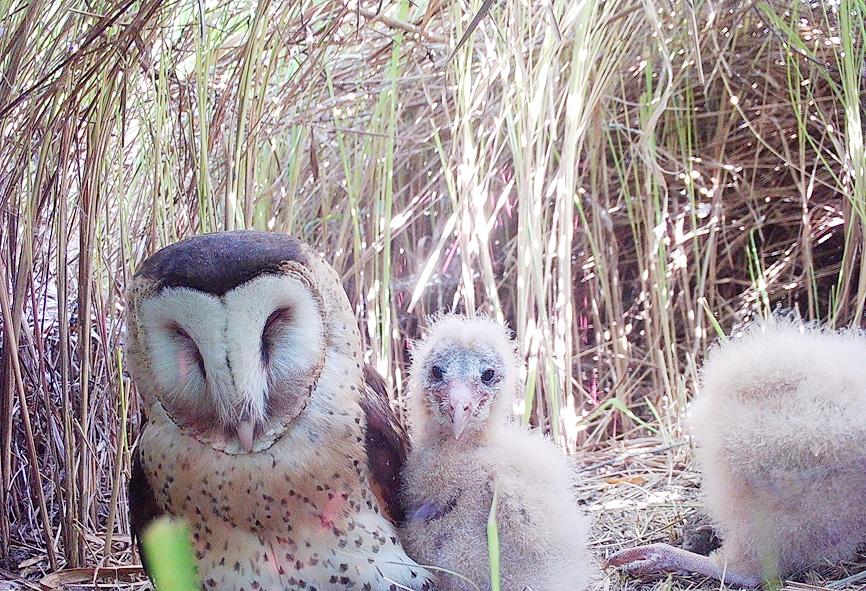The Forestry Bureau’s Pingtung office on Friday hosted a workshop on the conservation of the eastern grass owl and the extension of its habitats in Kaohsiung, and Pingtung and Chiayi counties.
Taiwan’s unique indigenous grass owl subspecies is one of six subspecies in East Asia, with populations in the lower reaches of the mountains of southern Taiwan, the office said.
The owl’s habitats largely overlap with extensively populated areas, and habit loss due to agriculture and urban development poses a major threat to its survival, the office said.

Photo: Chen Yan-ting, Taipei Times
Poisoning by agrochemical residues and accidental hunting also pose risks, it added.
Conservation efforts are complicated by a lack of data on the elusive nocturnal bird and little public awareness of the owl’s conservation status, it said.
The bureau in 2018 listed the owl as a subspecies of concern in the short and medium term, it said.
In May, the bureau included it on a list of 22 species and subspecies with nationwide priority conservation status, it said.
Programs to protect the owl include efforts to reverse habitat fragmentation and stop habitat loss, it said.
Additionally, the bureau is offering rewards to farmers who use sustainable methods and make efforts to protect target areas for conservation in their communities, it said.
The bureau’s branch offices in southern Taiwan should strengthen partnerships with researchers and conservation groups to protect the owl, it said.
Hung Hsiao-yu (洪孝宇), a researcher at National Pingtung University of Science and Technology, said that a government-funded program to build habitat platforms has achieved some success.
Video evidence shows that owls are occupying 10 of the 21 platforms that were built in southern Taiwan, providing bureau officials with important data on habitat distribution, he said.
Officials should inform farmers in the region that owls are natural predators of mice and that the farmers also benefit from the platforms, he said.

A decision to describe a Chinese Ministry of Foreign Affairs statement on Singapore’s Taiwan policy as “erroneous” was made because the city-state has its own “one China policy” and has not followed Beijing’s “one China principle,” Deputy Minister of Foreign Affairs Tien Chung-kwang (田中光) said yesterday. It has been a longstanding practice for the People’s Republic of China (PRC) to speak on other countries’ behalf concerning Taiwan, Tien said. The latest example was a statement issued by the PRC after a meeting between Singaporean Prime Minister Lawrence Wong (黃循財) and Chinese President Xi Jinping (習近平) on the sidelines of the APEC summit

Taiwan’s passport ranked 34th in the world, with access to 141 visa-free destinations, according to the latest update to the Henley Passport Index released today. The index put together by Henley & Partners ranks 199 passports globally based on the number of destinations holders can access without a visa out of 227, and is updated monthly. The 141 visa-free destinations for Taiwanese passport holders are a slight decrease from last year, when holders had access to 145 destinations. Botswana and Columbia are among the countries that have recently ended visa-free status for Taiwanese after “bowing to pressure from the Chinese government,” the Ministry

‘SIGN OF DANGER’: Beijing has never directly named Taiwanese leaders before, so China is saying that its actions are aimed at the DPP, a foundation official said National Security Bureau (NSB) Director-General Tsai Ming-yen (蔡明彥) yesterday accused Beijing of spreading propaganda, saying that Chinese President Xi Jinping (習近平) had singled out President William Lai (賴清德) in his meeting with US President Joe Biden when talking about those whose “true nature” seek Taiwanese independence. The Biden-Xi meeting took place on the sidelines of the APEC summit in Peru on Saturday. “If the US cares about maintaining peace across the Taiwan Strait, it is crucial that it sees clearly the true nature of Lai and the ruling Democratic Progressive Party (DPP) in seeking Taiwanese independence, handles the Taiwan question with extra

HEALTHCARE: Following a 2022 Constitutional Court ruling, Taiwanese traveling overseas for six months would no longer be able to suspend their insurance Measures allowing people to suspend National Health Insurance (NHI) services if they plan to leave the country for six months would be abolished starting Dec. 23, NHIA Director-General Shih Chung-liang (石崇良) said yesterday. The decision followed the Constitutional Court’s ruling in 2022 that the regulation was unconstitutional and that it would invalidate the regulation automatically unless the NHIA amended it to conform with the Constitution. The agency would amend the regulations to remove the articles and sections that allow the suspension of NHI services, and also introduce provisional clauses for those who suspended their NHI services before Dec. 23, Shih said. According to